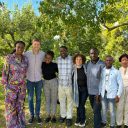What does it take to shift power in North-South grantmaking while also getting funds to bold African groups fighting for justice?
This question guided us – the ‘Core Group’ of African activists and civil society members from seven countries – as we co-created the Karibu New Realities Grant (KNRG) pilot project. Launched by the Karibu Foundation (Norway), the KNRG aimed to put decision-making power about grants in the hands of African activists, ensuring that funding decisions were made closer to the movements on the ground.
Over 2.5 years, we built a new fund from the ground up, and we’re excited to share the evaluation report that documents this journey.
A new vision for grantmaking
Through our experiences within movements – and often being on the receiving end of grants – we’ve seen how traditional funding structures in Africa create unnecessary barriers for grassroots movements. Civil society groups often face complex, donor-driven applications that don’t reflect the realities they’re working in. Activists fighting climate change, inequality, land rights, and more often find it difficult to secure funding, as donor priorities tend to overshadow local strategies.
KNRG was designed to support bold, forward-thinking groups tackling structural inequalities. These movements grow when people connect around a shared vision for justice, built on inclusivity, solidarity, and diversity. They aren’t always tied to protests or reacting to specific events. Often, they’re about sustained organising, political education, and pushing for deeper systemic change. Most start without any external funding, driven purely by community energy and commitment.
Recognising this, we focused on movement building and supporting the ecosystems that help movements thrive. Flexible and adaptable resources were key in such fast-changing environments.
Streamlining the process and reducing barriers
Simplifying the application process was a top priority. We cut down on administrative hurdles, offered low-tech options like WhatsApp for communication, and streamlined reporting to focus on the essentials. We also introduced more conversation-based approaches, like video submissions and “Sharing and Learning” conversations with grantees.
To truly support movement ecosystems, we needed to include both formal and informal groups. This required a lot of flexibility, creativity, and trust. Language was another challenge, so we made sure to open applications in English, French, and Portuguese, making it easier for diverse groups across the continent to participate.
Embracing ‘build the road as we go
Participatory grantmaking is messy and experimental, but that messiness was essential to our success. Adopting a ‘build the road as we go’ approach allowed us to learn and refine the process through multiple cycles. The process itself – building trust and ensuring no one was left out – became just as important as the outcomes.
To handle the complexities of working as a diverse group, we developed a ‘Communication, Expectations, Responsibilities’ document to help us navigate the interpersonal, cultural, and political dynamics.
Challenges still remained. We had to make adjustments to our process and structures along the way, and moments of uncertainty demanded both creativity and patience. Face-to-face meetings were crucial for maintaining momentum, and we brought in expertise from new Core Group members rooted in social movements to fill knowledge gaps.
Navigating power dynamics and privilege
Throughout the process, we worked to ‘de-donorfy’ our applications and avoid contributing to turning movements into just another set of NGOs. This required deep reflection on our own power and privilege. As Core Group members, we found ourselves in new positions of influence. Balancing our vision with practical realities (like resource scarcity, our own role in movements, and time restraints) was difficult, especially when sensitive political and social questions arose. Our diversity enriched the discussions, but also made them more complex. Yet we always aimed for consensus.
Future groups like ours should continue to critically examine their own power to avoid replicating the same old power structures.
The ongoing journey of moving power
As we wrap up the KNRG pilot, we hope future groups can learn from our experiences. We don’t claim to have found the perfect solution. In fact, we expect our views to keep evolving as we learn and unlearn. But all of this work is part of building something new.
Participatory grantmaking is a learning-by-doing process. It demands flexibility, trust, and continuous reflection. The KNRG pilot revealed both the strengths and the challenges of this approach, showing that while power can be moved, new complexities will always emerge. Deep participation takes time and trust, and finding the balance between efficiency and inclusivity remains a challenge.
Even so, the pilot proved that this approach is not only possible but necessary. As we continue this journey, we call on other donors to reflect on their own power, hand decision-making authority to grassroots movements, and avoid repeating the bureaucratic and technocratic models of the past.
The world’s challenges are growing more complex, and we need to support the movements leading the fight for justice.
The Core Group of the ‘Karibu New Realities Grant’ is comprised of activists and civil society members from seven African countries. Together, they co-created and led the participatory grantmaking program for the Karibu Foundation (Norway).






Comments (0)